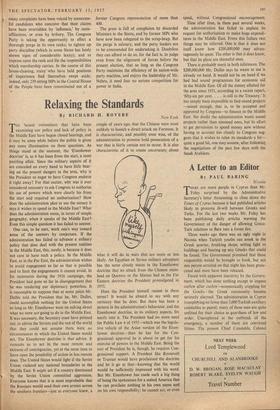Relaxing the Standards
By RICHARD H. ROVERE New York
HE Senate committees that have been I examining our policy and lack of policy in the Middle East have begun closed hearings, and it may be some while before the public is given any more illumination on these questions. As things stand at the moment, the 'Eisenhower doctrine' is, as it has been from the start, a most puzzling affair. Since the military aspects of it are conceded on every hand to have little bear- ing on the present dangers in the area, why is the President so eager to have Congress endorse it right away? For that matter, why was it ever considered necessary to ask Congress to authorise his use of powers which were clearly his from the start and required no authorisation? How does the administration plan to use the money it says it wishes to spend in the Middle East? What does the administration mean, in terms of simple geography, when it speaks of the Middle East? Even this simple question it has failed to answer. One can, to be sure, work one's way toward some of the answers by conjecture. If the administration has failed to advance a military policy that does deal with the present realities in the Middle East, this, surely, is because it does not care to have such a policy. In the Middle East, as in the Far East, the administration wishes to avoid engagement as far as that is possible and to limit the engagements it cannot avoid. In his statements during the 1956 campaign, the President had gone so far in disengagement that he was rendering our diplomacy powerless. It is reasonable to suppose that at some point Mr. Dulles told the President that he, Mr. Dulles, could accomplish nothing for the United States so long as Mr. Eisenhower went on talking about what we were not going to do in the Middle East. It was necessary, the Secretary must have pointed out, to advise the Soviets and the rest of the world that they could not assume there were no circumstances in which the United States would act. The Eisenhower doctrine is that advice. It commits us to act in, the most remote and extreme of contingencies, yet at the same time to leave open the possibility of action in less remote ones. The United States would fight if the Soviet Union violated any national boundaries in the Middle East. It might act if a country dominated by the Soviet Union committed aggression. Everyone knows that it is most improbable that the Russians would send their own armies across the southern frontiers—just as everyone knew, a couple of years ago, that the Chinese were most unlikely to launch a direct attack on Formosa. It is characteristic, and possibly even wise, of the administration to promise bold prosecution of a war that is fairly certain not to occur. It is also characteristic of it to create uncertainty about what it will do in wars that ,are more or less likely. An Egyptian or Syrian military adventure has the same cloudy status in the Eisenhower doctrine that 'an attack from the Chinese main- land on Quemoy or the Matsus had in the Far Eastern doctrine the President promulgated in 1955.
Does the President himself reason in these terms? It would be absurd to say with any certainty that he does. But there has been a pattern in the administration's behaviour, and the Eisenhower doctrine, in its military aspects, fits neatly into it. The President had no more need for Public Law 4 of 1955---which was the legisla- tive vehicle of the Asian version of the Eisen- hower doctrine—than he has for the Con- gressional approval he is about to get for his exercise of powers in the Middle East. Being the sort of President he is, though, he requires Con- gressional support. A President like Roosevelt or Truman would have proclaimed the doctrine and let it go at that—knowing that the world would be sufficiently impressed with his word. But Mr. Eisenhower has made such a big thing of being the spokesman for a united America that he can proclaim nothing in his own name and on his own responsibility; he cannot act, or even speak, without Congressional encouragement.
Time after time, in these past several weeks, the administration has failed to explain its request for authorisation to make huge expendi- tures in the Middle East. From this failure two things may be inferred. One is that it does not itself know how $200,000,000 may advan- tageously be spent. The other is that it does know, but that its plans are shameful ones.
There is probably merit in both inferences. The $200,000,000 Mr. Dulles says he wants to use is already on hand. It would not be on hand if we had had sound programmes for economic aid in the Middle East. Of all the money allotted for the area since 1951, according to a recent report, 'fifty-six per cent. . . . is still in the Treasury.' It has simply been impossible to find sound projects —sound enough, that is, to be accepted and approved by Congress—to finance in the Middle East. No doubt the administration wants sound projects rather than unsound ones, but its effort to get permission to spend money now without having to account too closely to Congress sug- gests that it wishes to relax its standards a bit— quite a good bit, one may assume, after following the negotiations of the past few days with the Saudi Arabians.


































 Previous page
Previous page